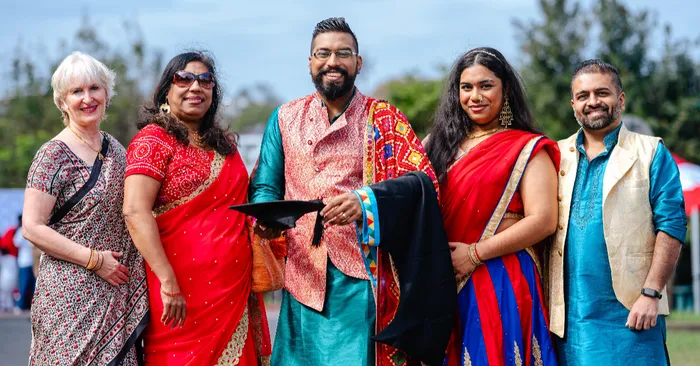Breaking gender boundaries: UKZN scholar's groundbreaking study on Nagara Dance
‘Queering Masculinity: Engaging the Performance and Meaning among Nagara Dancers in Durban'

Master’s graduate, Mr Nico Nehaal Ramdhani (centre) celebrates with (from left) his supervisor Dr Cherry Muslim, and his family, Ms Sashnie Ramdhani, Ms Dhiya Ramdhani and Mr Subashen Naidu.
Image: SUPPLIED
NICO Nehaal Ramdhani's groundbreaking research explores how male Nagara dancers in Durban challenge traditional gender norms through ritual performance, offering new perspectives on masculinity and sacred femininity in South African Indian cultural traditions.
‘Queering Masculinity: Engaging the Performance and Meaning among Nagara Dancers in Durban, KwaZulu-Natal’, was Ramdhani's research paper.
Drawing on gender theorist Judith Butler’s gender performativity theory and the lived experiences of dancers, Ramdhani’s study examines how ritual embodiment allows for a fluid integration of sacred femininity and social masculinity, challenging dominant gender norms.
Ramdhani, who graduated with a Master of Theology in Gender, Religion and Health from the University of KwaZulu-Natal (UKZN), is a dancer, University of KwaZulu-Natal (UKZN) Academic Development Officer, and a scholar of gender studies, interested in how embodied practices reflect and reshape identity.
This accolade marks the culmination of a deeply personal journey rooted in dance, identity, and resilience.
“My personal experiences in contemporary dance and ritual performance inspired me to explore how dance can be both a spiritual offering and a political act of gender reclamation. The inner performer emerged through writing and understanding dance through the lens of religious performativity,” he said.
Shedding light on the tradition of Nagara dancers, Ramdhani explains that they are typically men who wear women’s clothing and perform religious dances. Brought by Indian indentured labourers in the 1860s, the practice is a form of entertainment and cultural preservation.
Often performed to the music of the Nagara drum, the dance honours the goddess Saraswathi, among other deities.
Ramdhani’s study revealed that masculinity is not a rigid category, but one that can expand, move, and embrace sacred femininity.
“I found that Nagara dancers do not experience ritual femininity as a contradiction to their masculinity, but as a means of expanding it, offering a culturally grounded model of inclusive masculinity.”
His work is also the first academic study in South Africa to explore Nagara dance through the lens of queer theory. It offers society a powerful counter-narrative to restrictive gender norms and contributes original insights into how ritual performance can challenge econo-heteropatriarchal constructions of masculinity.
By challenging hegemonic gender constructions, Ramdhani’s research validates non-binary expressions of gender within sacred spaces and promotes emotional and spiritual depth in male identity formation.
A proud owner of Nehaal Productions, a non-profit dance company where he serves as choreographer and director for theatre productions and local dance shows, Ramdhani said: “My entire life has been shaped by dance, temple rituals, and a family deeply committed to community and education.”
Commenting on how completing his master’s was both humbling and empowering, Ramdhani said: “This thesis represents reclaiming my voice through ritual, theory, and movement.”
Looking ahead, he hopes to expand Nehaal Productions into a creative platform merging dance, scholarship, and social advocacy, while pursuing doctoral research that continues to challenge gender norms in sacred and cultural spaces.
Dance has carried Ramdhani through struggle and triumph alike.
His story is a reminder that research is not only about knowledge - it is about humanity, resilience, and the courage to reimagine what it means to be whole.